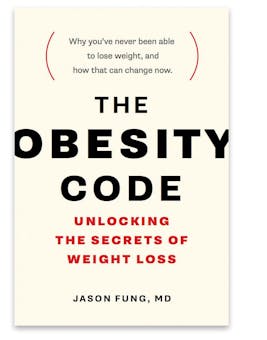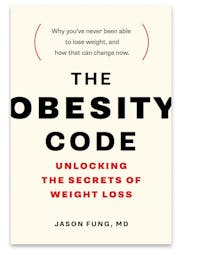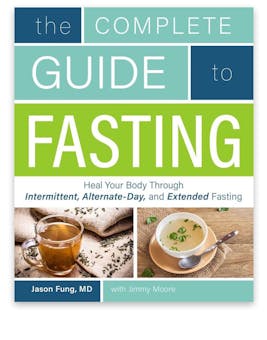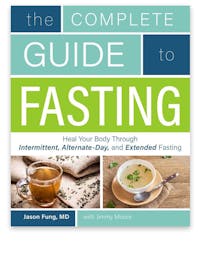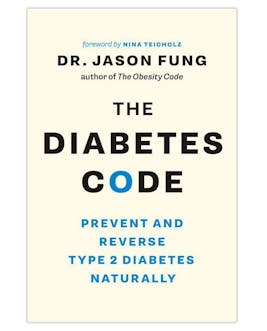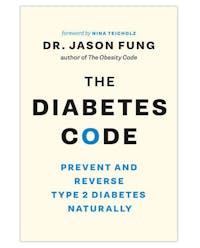Why is blood glucose elevated when fasting?

Why is blood glucose elevated when fasting? Do you need keto macro guidelines when fasting? What is the optimal way of breaking a fast? And, can you talk about the psychological part of fasting?
It’s time for this week’s Q&A about intermittent fasting and low carb with Dr. Jason Fung:
Fasting & elevated blood glucose
Type 2 diabetes for 20+ years. Started keto with intermittent fasting in January 2019. Why would my fasting blood glucose numbers during my 18-24-hour fast be elevated, then come down to normal ranges after eating?
Mindy
Fasting can definitely raise blood glucose. This is due to the effect of insulin falling and the rising counter-regulatory hormones including increased sympathetic tone, noradrenaline, cortisol and growth hormone, in addition to glucagon. These all have the effect of pushing glucose from liver storage into the blood. This is normal. If you are not eating, you want to use some stored glucose. The question is this – if you are not eating, and your blood glucose went up, where did that glucose come from? It can only have come from your own body (liver). So, it’s a natural phenomenon, and the fasting now allows your body to use some of the glucose for energy.
Dr. Jason Fung
When combining keto and 5:2 intermittent fasting on fasting days, do you still follow the macro guidelines for keto?
On the two days of fasting, should the 500 calories consumed be of the same macro proportions as followed on the normal keto days? Or can you consume 500 calories of any food without going out of ketosis?
Andrea
I don’t generally recommend people to count calories. Fasting means not eating anything at all, so there is no ‘counting macros’. Dr. Mosley’s 5:2 diet allows 500 calories of whatever you like. But that’s his diet, not mine. I advocate intermittent fasting, with no calories.
Dr. Jason Fung
Veggies or fat or protein
I was taught to eat my salad first, then the meal… but I read that you advised to break a longer fast with ¼ cup of Macadamia nuts, and an hour later a salad. He talked about the veggies doing their thing in the upper intestine, and the fat and protein in the lower. My question is which should I eat first to receive the best benefit. I eat once a day while fasting at least 24 hours. When 24 hours comes past 8 pm, I wait until the next day around lunch, then move ahead one hour each day and repeat.
William
I think you should eat the salad first. There is some data to suggest that eating the veggies first reduces insulin.
Dr. Jason Fung
Will fasting for long periods of time activate the famine/fat protocols in the body?
Hi Dr Fung,
I’m very interested in intermittent fasting and keto for weight loss, I am however concerned about the “starvation” factor – not so much physiologically but also mentally. I’ve just finished reading Jon Gabriel’s book where he talks about fat programs in your body and the importance of not “dieting” or denying yourself food because it activates the fat programs. I’m worried that fasting will “switch on” the “famine/fat program” and there will be more weight gain in the long run. Can you help me understand how fasting will not activate the “fat/famine” protocol in my mind and body?
Kerren
Yes, the psychological part of fasting is hard. Fasting is supposed to be a part of everyday life – that is why we have the word ‘break-fast’. Most people think they can’t do it, but the truth is that people have fasted throughout history. We only think we can’t. As with anything else, it is about getting the right education and the right support group. From a physiological standpoint, fasting allows you to burn body fat, which is a storage form of food for your body when no food is available. This is what most people want.
Dr. Jason Fung
More
Intermittent fasting for beginners
More with Dr. Fung
Dr. Fung has his own blog at idmprogram.com. He is also active on Twitter.
Dr. Fung’s books The Obesity Code, The Complete Guide to Fasting and The Diabetes Code are available on Amazon.1
Diet Doctor will not benefit from your purchases. We do not show ads, use any affiliate links, sell products or take money from industry. Instead we’re funded by the people, via our optional membership. Learn more ↩
